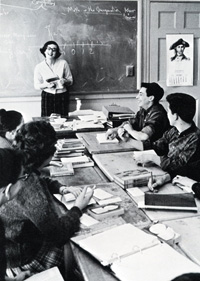The History of Education at Vassar College
By Associate Professor Christopher Bjork
January 2011
Department Website
Vassar has long been a popular school for students interested in the field of education. In 1898, a course titled Education Psychology was offered in the Philosophy Department, taught by Professor Ferdinand Courtney French. A few years later, a second course, The Theory of Education, which covered topics such as child psychology and growth, was added. It was not until 1924, however, that an education field-of-study program appeared in the Vassar catalogue. That program referred students to five courses in the departments of Philosophy, Physiology and Hygiene, and Psychology. From 1927 to 1934, a course titled The Advancement of Learning was offered. The course looked at higher education, with a focus on the American college curriculum and its vocational and avocational applications. The course was implemented in tandem with the 1927 opening of the Wimpfheimer Nursery School, an early-childhood center which served both as a school and as a child development laboratory; the leaders of the school conducted psychological studies on children and, under psychologist Joseph Stone, were able to conduct research on child development. In the late 1930s, the college began preliminary plans with the New York State Board of Education to offer a teaching certification program. Vassar students interested in elementary and secondary education could engage in vocational training at Wimpfheimer and in the Poughkeepsie area's public and private schools.
In the late 1960s, the college introduced a sequence of courses in preparation for teaching. Three full-time professors, each specializing in different areas of education, were employed to aid interested students. In 1972, Education finally became its own department, with Emma McConnell as the department chair. In 1983, members of the Education Department, together with colleagues at other liberal arts colleges in the northeast, formed the Consortium for Excellence in Teacher Education. This group continues to meet regularly to discuss issues related to teacher education and to sponsor programs that will benefit students at all 19 institutions. Historically located in Blodgett Hall, the department moved, in 2009, to the Judith Loeb Chiara '49 Center at the Maria Mitchell Observatory following the building's extensive renovations. Students interested in becoming educators can earn licenses to teach at both the elementary and secondary levels. Students are required to complete work in the academic fields in which they planned to teach (for instance, English, mathematics, science, or a variety of foreign languages), as well as courses in education. Although education is not a major at Vassar, students may earn a correlate in Educational Studies. The correlate, which was introduced in the fall of 2008, was designed to provide students with an interest in education the opportunity to add intellectual depth and coherence to their studies in this area.
Beginning in the 1980s, the Education department began to focus on and expand its outreach programs. The Clifden Internship program in Ireland, developed in 1986, and the Cloud Forest school program in Costa Rica, founded in 2009, provide Vassar students with the opportunity to work with students while gaining valuable educational experience in schools. In more recent years, the department has focused on strengthening its ties with the Poughkeepsie community. The oldest of such programs, Exploring Science at the Vassar Farm, has given over 24,000 local elementary school students the opportunity to experience hands-on scientific activities on the farm since its inception in 1983. More recently, in 2003, the Education Department received a grant by the Arthur Vining Davis Foundation to start the Urban Education Initiative, a program developed to expand field work options for students interested in urban education and to promote collaboration between Vassar professors and local schools. The Urban Education Initiative was expanded in 2009 by a cash award from the Dyson Foundation. In 2010, a five-year grant was given to Vassar by the Robert Noyce Teacher Scholarship Program for the purpose of preparing talented math and science students to become teachers in high need public school districts. The Education Department currently includes five full-time professors and three people who oversee the Urban Education Initiative. Approximately 400 students enroll in courses offered by the department each year.

